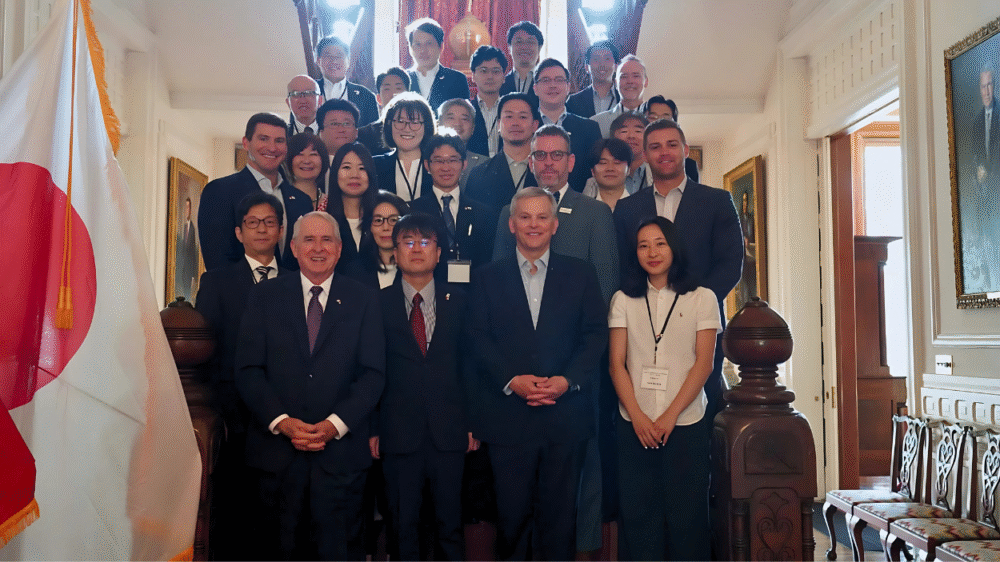Growing Global Interest in Entrepreneurship
Global interest from NC State’s international partners in learning about entrepreneurship and innovation has grown over the last decade, especially as the university continues to be recognized for having one of the top undergraduate and graduate entrepreneurship programs in the country. NC State Entrepreneurship faculty have partnered with the Global Training Initiative in the Office of Global Engagement over the last few years to meet the growing demand.
“Partnering with NC State GTI has allowed me the opportunity to help take NC State Entrepreneurship well beyond the borders of North Carolina,” said Jennifer Capps, the interim assistant vice provost for NC State Entrepreneurship. “A few of the exciting things that we have participated in include helping universities in Russia develop and grow student-focused entrepreneurship programs, working with faculty throughout Saudi Arabia to support their development of entrepreneurship courses and curriculum, and partnering with Nagoya University to teach entrepreneurial thinking workshops to their students each year.”
In addition to traveling overseas to conduct training and workshops, the GTI has also hosted groups from across the globe, including Palestine, Uganda, Cote d’Ivoire, France, Sri Lanka, South Korea, Armenia, Mexico, Argentina, and Bangladesh. This past summer, Capps co-taught an intensive two-day workshop on Interdisciplinary Entrepreneurship Thinking alongside David McNeill, associate director for GTI. The virtual program included participants from Zhejiang University in China, and involved interactive activities and discussions, experiential learning activities to help them develop an entrepreneurial mindset and actionable next steps.
Adapting to Various Cultural Contexts.
“The heart of entrepreneurship is immensely rewarding: to create value where there was no previous value,” McNeill said. “And the complexity of creating value in different cultural contexts makes for a fascinating puzzle to solve and one that has the potential to impact many lives around the globe.”Both Capps and McNeill have worked to adapt their teaching materials based on the culture of the groups with which they are working. The strategies they employ to teach entrepreneurship often vary significantly from country to country.
“GTI, in partnership with NC State Entrepreneurship, is strategically equipped to contextualize the resources and curriculum we have used successfully in the United States to a broad range of cultures around the world,” McNeill explained. “A key part of that is having partnerships with insiders in these other cultural contexts to make fluid translations of key concepts.”
For example, some cultures view failure as something to be ashamed of, so how does an entrepreneur balance the inevitable failures that are inherent with this career path with the need to not embarrass themselves or their families? But even those cultures have acceptable ways of taking risks so that a failed venture can still allow the entrepreneur to keep his or her positive reputation intact.
“Unique cultural attributes play a very large role in how many entrepreneurs proceed with their goals,” Capps added. “Teaching entrepreneurship in a global environment becomes a constant assessment of what entrepreneurs need balanced with the very specific nuances of their particular cultures.”
Modeling Entrepreneurship and Innovation
Both McNeill and Capps believe the entrepreneurship ecosystem that has been developed at NC State within the greater Triangle community serves as a great model that universities and organizations from other countries can learn from as they develop their own programs.
“A common theme we hear from our entrepreneurship faculty partners around the world is that while Silicon Valley is amazing to visit and hear what has transpired there, it is an impossible scenario for us to recreate that in our corner of the world,” McNeill added. “What has happened in North Carolina is much more relatable and repeatable. As these partners contextualize entrepreneurship in their regions, they share best practices with us at NC State so that we can continue to iterate our model.”
This exchange of knowledge and best practices from global partners helps provide fresh perspectives and new insights as NC State continues to grow its entrepreneurship programs.
“One of my favorite things about being an entrepreneurship educator is the pace at which our field adapts, pivots and evolves. There is always something new to learn or something that needs to be created,” Capps said. “NC State is and will remain a leader in global entrepreneurship by constantly pushing the boundaries as to what is possible in entrepreneurship education and by translating these experiences into best practices.


